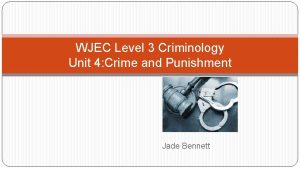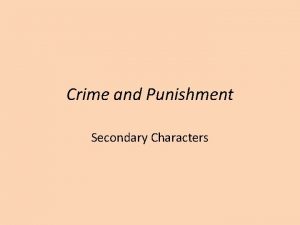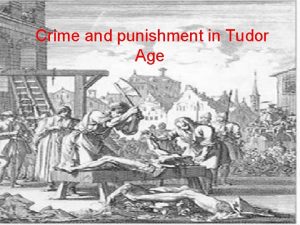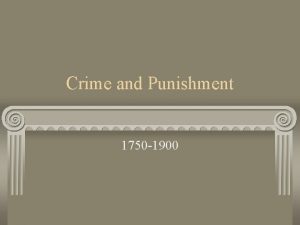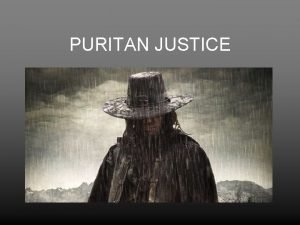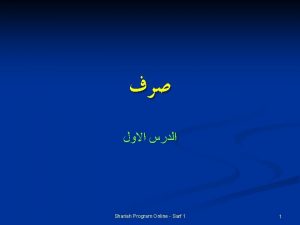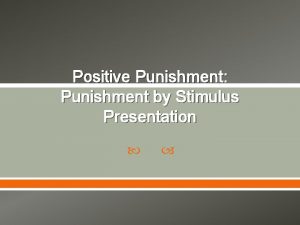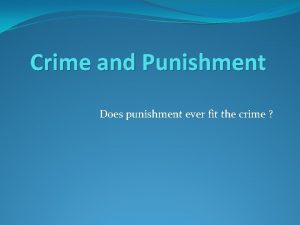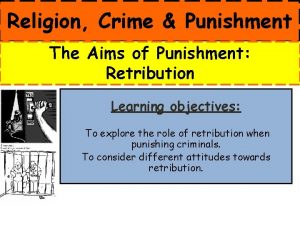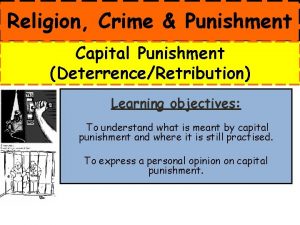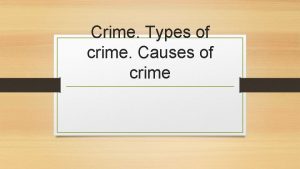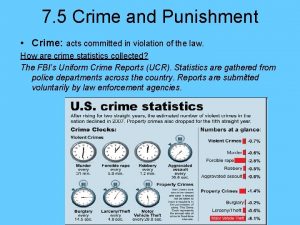Shariah Law Crime and Punishment What is Shariah























- Slides: 23

Shariah Law Crime and Punishment

What is Shariah law? • It literally means a “a path to be followed” • Technically – it is a complete code of Moral, Social, Economic, Political and Religious life adopted by all/ most Muslims • In a nutshell: Shariah = Islamic Law

Sources of Shariah Law 1 • The Quran (Muslims believe it contains God’s Law) • The Teachings of the Prophet Muhammad – (Who interpreted and explained the laws of God) • Analogical deduction – Quran doesn’t address each and every human situation. (That is literally impossible) So in the sitaution where something is not in the Quran or the Teachings of the Prophet – ‘universal principles’ from the Quran are used along with reason to deduce a ruling. – E. g: Alcohol is forbidden (illegal) in the Quran because of its negative impact on intellect and other things – No ruling for other harsh drugs can be found in the Quran – The two are similar in that they have a negative impact on the intellect – thus harsh drugs take the same ruling as Alcohol. Harsh drugs are also ‘illegal’ under Shariah Law.

Sources of Shariah Law 2 • Public Interest/ Good – Looking at what is in the best interest of the society. (see slide 6) • Customary Practice – General practices of people from country to country are different. The custom of the people is sometimes considered.

What does Shariah cover? Shariah Law covers the rules and regulations concerning: • Ritual Worship of Muslims • Family Law – Marriage and Divorce • Economic/ Business Law – make sure all financial transactions are fair and just • Inheritance Law – Money of deceased are fairly distributed • Criminal Law – ensure justice and stability in society • International Law – Concerns all aspects of International Relations. E. g: Trade and Sanctions, Peace Treaties, Rules of War etc

Objectives of Shariah Law aims to provide protection of: 1. 2. 3. 4. 5. 6. Religions (all religion and beliefs) Life Lineage Wealth Intellect Honour and Dignity

Clarifying misconceptions • Muslims living in countries that do not have Shariah law MUST obey the law of the country they are in, as following the law of the ‘host’ country is also part of Shariah Law. • Not anybody can apply Shariah Law – it must go through the courts and follow due process • Only a qualified Judge has the right to make a ruling • The premise is – Innocent until proven guilty!

Crime and Punishment • Like any legal system, different crimes have different punishments. • This can range from: – Paying a fine – Community service – Going to jail – In serious crimes, capital punishment is still sometimes enforced, but has strict conditions attached before it can be implemented • Capital punishment – i. e: death penalty, lashing, chopping off the hand

Islamic Criminal Law Today … Tariq Ramadhan: “The majority of the ulamâ’ (Muslim scholars), historically and today, are of the opinion that these penalties are on the whole Islamic but that the conditions under which they should be implemented are nearly impossible to reestablish. These penalties, therefore, are “almost never applicable”. The hudûd [capital punishment] would, therefore, serve as a “deterrent, ” the objective of which would be to stir the conscience of the believer to the gravity of an action warranting such a punishment”

Death Penalty • Treason – conspire against the state • Intentional Murder (eye for an eye) • Committing Adultery (‘Cheating’ on your spouse), but there are conditions: * – There must be 4 witnesses to have witnessed the 2 people engaged in intercourse (they each must be there in person and see the actual penetration of the body parts) – The 4 witnesses must all be considered truthful people, who must each have 2 people to attest to their truthfulness – There must be no doubt that the act happened – The one accused must admit to their guilt – The judge must be 100% certain, and must give the accused 3 opportunities to appeal against the decision. *If anyone of the above conditions are not met the punishment cannot take place

Lashing • Fornication (Sex outside of marriage), but there are conditions: Same as adultery

Cutting off the Hand • When someone commits theft. • Basic Conditions: – The person must be sane, over 15 years of age, and not living in poverty – Petty theft is not included – theft must be of a significant value – For an item to be considered stolen it must be taken from the owners possession and put into the possession of the thief in a place that is considered a place of safe keeping – Stealing of food is not considered – The evidence against the convicted person must be beyond reasonable doubt

In all cases … • Innocent until proven guilty! • In terms of capital punishment - The principle rule for the judge: ‘Avert the capital punishments with doubt’ Meaning: The judge should look for every reason to avert the death penalty, lashing, and chopping of the hand; by considering all possible scenarios, ensuring that these punishments are only applied in the worst and most serious of cases

Case study • In Turkey, during the ottoman empire, a woman was convicted of fornication. • She had become pregnant • However the judge ruled in her favour by suggesting that: – She used a hammam (a public bath – common in Turkey in those days) – There might have been some sperm (from a previous male user) that she sat on which could have possibly impregnated her – The possibility of such a thing occurring = doubt – Thus no punishment

Consider the Following Scenarios…

Scenario 1 • 14 year old boy steals a car • No charge – too young, however judge may rule to have some community service • The guardians will be rebuked – but no charge; however compensation must be paid for any damages and inconvenience caused

Scenario 2 • A man has a secret affair with a married woman • No charge – No witnesses – Impossible to prove

Scenario 3 • A man steals a chocolate bar • Petty Theft: ASBO/ Fine/ Community service, but no capital punishment – value too less

Scenario 4 • A rich man steals an expensive item If the man is sane Knows full well that stealing the item is a crime – (sane) Publically admits to the crime of theft After taking the item he puts it in a place of safe keeping (i. e: his own house or its like) – No doubt in the matter of his stealing – No plausible reason for taking the item – If item was not in a place where it is prone to theft – – • Ruling: Hand chopped off

Scenario 5 • A poor girl steals some food • No punishment on grounds of poverty (under Shariah Law, the state is responsible for eradicating poverty)

Scenario 6 • There is a famine/ drought • All capital punishment related to theft is dropped – due to public interest • However crimes of theft may result in paying fines, and in very serious cases jail time.

Activity • Consider the Benefits and Disadvantages of Shariah Law: Benefits Disadvantages

Debate whether the application of Shariah Law would be beneficial for a society
 Wjec criminology unit 3 notes
Wjec criminology unit 3 notes Crime and punishment revision guide
Crime and punishment revision guide Andrei semyonovich lebezyatnikov
Andrei semyonovich lebezyatnikov Crime and punishment in tudor times
Crime and punishment in tudor times Unit 4 wjec criminology
Unit 4 wjec criminology Medieval crime and punishment facts
Medieval crime and punishment facts Edexcel gcse history crime and punishment past papers
Edexcel gcse history crime and punishment past papers Kahoot crime and punishment
Kahoot crime and punishment Crime and punishment in medieval japan
Crime and punishment in medieval japan Crime and punishment 1750 to 1900
Crime and punishment 1750 to 1900 Criminology unit 4 crime and punishment
Criminology unit 4 crime and punishment Crime and punishment key words
Crime and punishment key words Crime and punishment topic
Crime and punishment topic Unit 4 criminology wjec
Unit 4 criminology wjec Tsw crime and punishment
Tsw crime and punishment Puritanical methods of punishment
Puritanical methods of punishment Thesis statement on the death penalty
Thesis statement on the death penalty Plagiarism crime punishment
Plagiarism crime punishment Sarf chart
Sarf chart Riba an nasiyya
Riba an nasiyya Al meezan shariah compliant list
Al meezan shariah compliant list Newton's first law and second law and third law
Newton's first law and second law and third law Newton's first law and second law and third law
Newton's first law and second law and third law V=k/p
V=k/p
